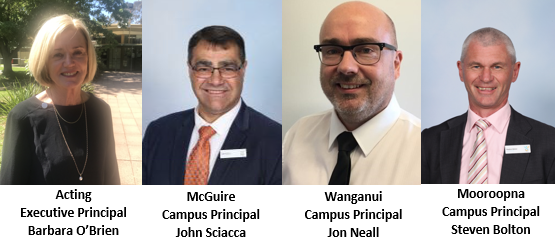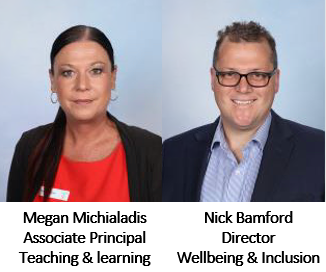GSSC Leadership Team
Image - Artist Impression

GSSC Leadership Team
Image - Artist Impression
I finished Year 12 in 1991. Depending on who you are in the College community, this either makes me very old, or (maybe!) still quite young. Of course, like many people, my school days still seem quite easy to recall, and don’t at all seem as long ago as the amount of years might suggest. Of course, the fact that Ed Sheeran was born in the same year perhaps dates me a bit. As recent as it might seem to me, one thing I can definitely say about that passage of time, from 1991 to now, is that the purpose of education has changed considerably.
When I went to school, while differentiated learning, student voice, metacognitive strategies, the importance of feedback, formative assessment and restorative practice may have, in isolation, been part of the practice of the odd teacher here and there, they were by no means the practice of all. The internet did not exist. We probably watched much more TV than our students do today (mainly because it was the only ‘screen’ that we had). We were limited though; our access to a globalised and connected world was very much less than it is now.
One thing is for sure though, the skills that we needed (or were thought to be needed) in the workplace nearly thirty years ago were very different to the skills that we know our young people will need today.
Recently, I have re-read two reports that comment on the future of work both in Australia and throughout the western world. They make for interesting reading (the links are provided below). The University of Phoenix report titled Future Work Skills 2020 points out the disruptive societal shifts that are reshaping the landscape of our modern workforces today and into the future:
What does this mean for our students, or for us as parents and teachers? The report notes ten skill areas that it considers crucial to success in this changing workplace:
The implications for both schools and individual students are clear. In the education sector, we might need to think about how we can place greater emphasis on critical thinking, and the ability to analyse information. We need to integrate, rather than ignore, new media and focus on digital literacy.
Prominence must be given to those key social skills: the ability to collaborate, to work in groups, to read social signals and cues, and to respond adaptively to a diverse range of people. We perhaps also need to think less in terms of specific isolated subject areas, and more in terms of interdisciplinary training that integrates knowledge and skills from a range of subjects.
Our students (your children), will need to primarily be adaptive. They will need to recognise that the workplace that they enter will be one of constant change. They will always need to be learners, and will have to reassess their knowledge and skills to meet new and diverse needs and requirements. In short, they will need to be adaptable, lifelong learners.
I don’t know how I would go being one of our young people today. They face challenges that, while not necessarily better or worse, are definitely different to the challenges faced by many of us (teachers and parents) when we were young.
Our joint role, of course, is to support them in this as best we can, and prepare them for a world that is in a constant state of flux.
I encourage you to read the full report and one from an Australian perspective titled ‘The New Work Order’. They each provide a valuable insight into the world our young people are currently preparing themselves to enter. It might be the basis of a productive conversation with your child, either now or in the future.
http://www.iftf.org/uploads/media/SR-1382A_UPRI_future_work_skills_sm.pdf
http://www.fya.org.au/wp-content/uploads/2015/08/The-New-Work-Order-FINAL-low-res-2.pdf
Jon Neall
Campus Principal - Wanganui
The Leadership Team
Greater Shepparton Secondary College



